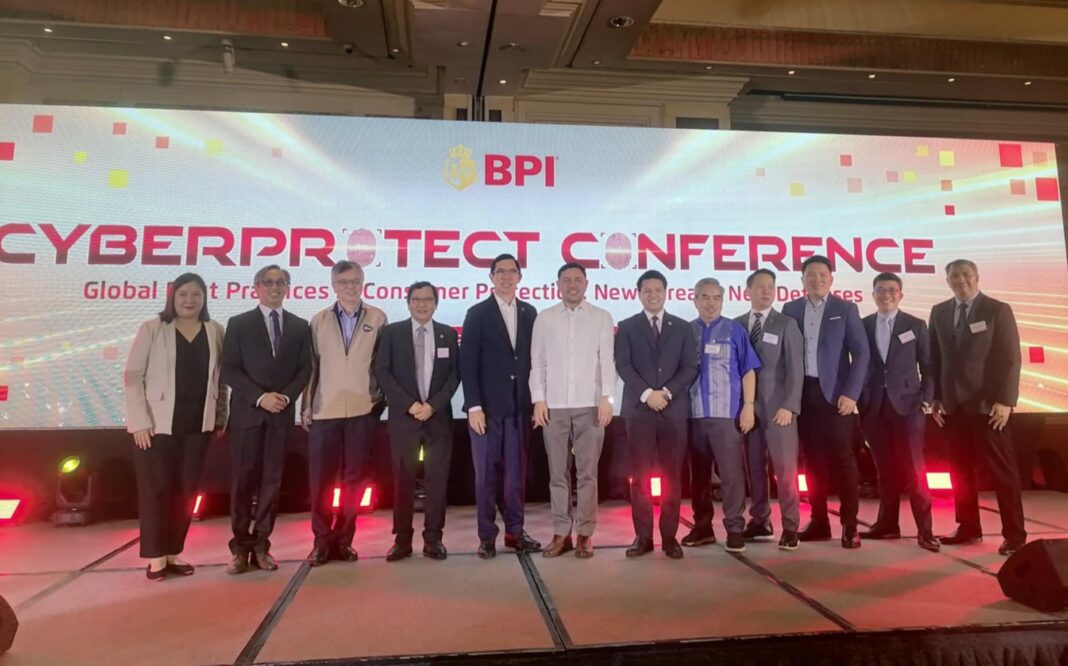By Perfecto T. Raymundo, Jr.
MAKATI SHANGRI-LA HOTEL — The 3rd BPI Cyberprotect Conference, with the theme: “Global Best Practices in Consumer Protection: New Threats, New Defenses”, was held here on Wednesday (July 30) with the participation of key stakeholders in government and private sector.
“We must be proactive and adaptive, learning not just from our own experiences but from the entire global community,” TG Limcaoco, BPI President & CEO, said.
“It’s not just about what others are doing — it’s about how we can walk… A deeper understanding of evolving cyberthreats,” Limcaoco added.
“At BPI, we don’t take this responsibility lightly,” he said. ” Let’s get these things started,” he added.
Maria Elena Toribio delivered the message of President Ferdinand R. Marcos, Jr.
President Marcos cited the beginning of the BPI since 1851.
President Marcos was delighted to join the BPI Cyberprotect Conference with the theme: “Global Best Practices in Consumer Protection: New Threats, New Defenses”.
“I wish you a delightful and fruitful event,” Marcos said.
Senator Mark Villar said that he is so happy that the important event has become grandier and grandier with the leadership of TG Limcaoco.
Villar cited the significance of Cybersecurity in today’s digital technology and digital transformation.
“The threats of cyberthreats is spreading like wild fire in terms of sophistication,” he said.
“We cannot expect that the customers are cyber experts,” he added.
Villar stressed that the policy must be agile and adaptive.
“It requires greater responsibility in the robust e-commerce system,” Villar said.
He cited the E-Commerce Bureau in the DTI that monitors and addresses frauds and scams in trade and Industry.
“Let us make this conference as a catalyst of change,” Villar said.
He cited the advocacy of Limcaoco.
In a video message, DICT Secretary Henry Aguda said that Cybersecurity is not only a normal issue but has become a national threat.
“We have formulated the 2025-2030 National Cybersecurity Protection,” Aguda said.
“Let’s harmonize the digital ecosystem,” he added.
On the Global and Local Strategies, BSP Deputy Governor Elmore Capule delved into the Anti-Financial Account Scamming Act, saying that “We cannot investigate the account because of the Bank Secrecy Act.”
“After criminalizing many acts such as illegal drugs and money-laundering, the criminal acts are still there,” Capule said.
“Criminalize certain acts such as money muling, which is also the same with money-laundering, social engineering, economic sabotage,” he added.
Capule cited the legal responsibilities of financial institutions such as fraud management system.
Temporary holding of disputed funds, which is good for five days and can be extended up to 30 days effectively freezing the account without a court order.
Exceptions to Republic Act No. 1405, otherwise known as the “Bank Secrecy Law”, where there is the BSP’s power to inquire into financial accounts.
Rep. Brian Poe Llamanzares, Chaiman of the Global AI Council Philippines Inc, has filed a Bill in the House of Representatives establishing the legal and institutional framework for AI (Artificial Intelligence) in the Philippines.
Rep. Llamanzares noted that DICT Secretary Henry Aguda also helped in the crafting of the House Bill on “Konektadong Pinoy”.
He cited how to use AI in protecting customer data from rising phishing, fake calls, and account takeovers such that systems must evolve with these threats and innovations.
“Customer education and scam alerts are very important which can help me and other people,” he said.
AI users claim that 84% are concerned about cybersecurity.
“As of late 2023, more than 8.7 million Filipinos were using digital banking platform with total deposits reaching PHP87 billion. It means the people trust you,” Rep. Llamanzares.
Prof. Philip Kwa, Academic Program Director and Master in Cybersecurity from Asian Institute of Management, cited that out of the more than 50,000 scam cases in Singapore, the scam victim profile where ages 19 and below tend to fall prey to e-commerce scams, job scams, phishing scams, investments scams, and fake fraud scams.
“We also have a lot of international collaboration,” Prof. Kwa said.
The Scamshield, which is also present in the Philippines, where the banks remove clickable links in emails, and SMS sent to customers.
The anti-scam initiatives – shared responsibility framework to protect the consumer accounts.
On anti-scam legislation, Commencement of the Protection from Scams Act.
“It is not about legislation. It is about protecting our customers,” Prof. Kwa said.
“In Singapore, at the age of 65, especially when you started to work at the age of 13, a lot of us have a lot of money from the Central Provident Fund,” he added.
Prof. Kwa stressed that not every examples that he shared will work in the Philippines. ###







